Last Updated on March 6, 2021 by Dean Anderson
Have you worked your way through a series of cheap or inferior quality tents?
Are you now looking to invest a little more money but in a tent that will last? Then perhaps you’re ready for a heavy-duty canvas tent for camping. In principal a tent that could last a lifetime if cared for.
In this guide, we’ll look at the ins and outs of canvas tents and then look at some of the best canvas tents available.
Why choose a canvas tent?
Here are some of the main benefits of heavy-duty canvas tents for camping.
Breathable material
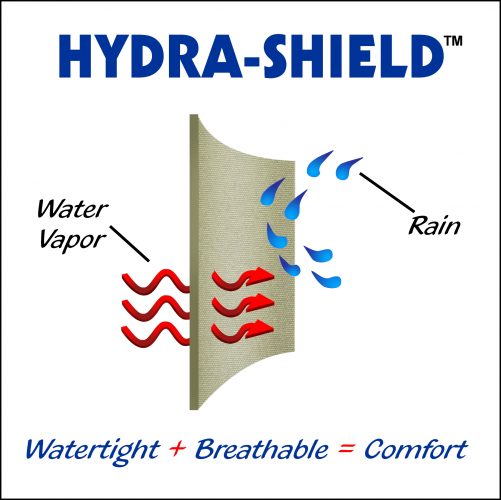 Cotton canvas is a more natural material to the synthetic materials some tents are made of. The biggest upside of this is that it results in a more breathable and better-ventilated tent. Moisture is repelled while air and water vapor is allowed to pass through the walls. This is demonstrated in the Hydra-Shield diagram from Kodiak.
Cotton canvas is a more natural material to the synthetic materials some tents are made of. The biggest upside of this is that it results in a more breathable and better-ventilated tent. Moisture is repelled while air and water vapor is allowed to pass through the walls. This is demonstrated in the Hydra-Shield diagram from Kodiak.
This means the internal space won’t get too hot on a warm day or too cold on a cool day. Furthermore, condensation doesn’t build up on the inside of the tent or result in puddling on the floor as can happen in synthetic tents.
Built-in UV protection
Cotton fabric is inherently thicker and thus more durable to the effects of UV radiation. This will protect you, the occupant. Long term you can also lightly treat your canvas tent with products like Nikwax or similar that incorporate additional UV protection. This will help protect the tent material itself. Don’t overdo this though as you’ll impact the breathable nature of the canvas.
A quieter more insulated space
You can have the most expensive tent going but if it’s made from synthetic material it’s going to make noise. The material will rustle as it flaps in the wind and when zippers are used. Canvas alternatives are thicker, absorb more sound, and help insulate a tent. With a quieter space, you might just get a better night’s sleep plus there’s that feeling of more protection from the outside world, perfect for winter camping.
Incorporate a wood-burning stove for Hot Tenting
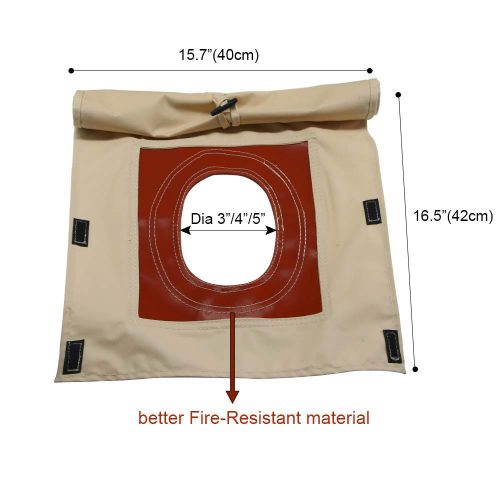
Most of the best canvas tents, particularly of the canvas wall tent variety incorporate a flue pipe jack on the roof of the tent. This means you can safely pass through a flue pipe without burning the rest of the tent. This can only be achieved with canvas or polycotton-made tents.
If your canvas tent doesn’t already have a tent stove jack you can add one after using one of the many kits available. Like the PlayDo example shown in the image.
Many hunters, outfitters, and prospectors see this as a must-have feature, especially if they’re camping further north. They use the tent stove continually for heating, cooking, and drying.
Seasoning and waterproofing your tent
Before using a heavy-duty canvas tent for the first time you’ll need to season it. This sounds way more complex than it actually is. Seasoning your canvas tent means that when it rains while you’re out camping you’ll be protected and your tent won’t leak.
To season your camping tent set it up at home before you actually need to use it. Then either wait for it to rain or hose your tent down with a light hose spray. This will allow the cotton to expand then contract as it dries. Closing all the small holes and gaps in the material. Next time it gets wet, the water will runoff.
See this post for more information on seasoning and waterproofing any tent.
Types of canvas tent design
In terms of the type of canvas tents available the majority on the market are either cabin, bell or wall tents. There are a few dome and tunnel tents but these are the exception and not the norm.
Cabin tents
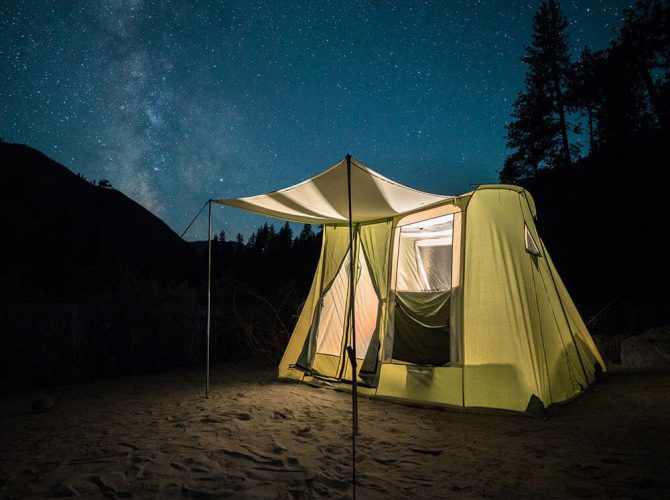
The majority of canvas tents we review for family campers are of the cabin variety. Brands like Springbar and Kodiak offer a large range of options to suit all group sizes and requirements. Furthermore, they’re great in all weather conditions.
Cabin tents are great because they’re generally sturdy, offer accommodation with a good ceiling height that you don’t have to stoop in, and incorporate all the features that families require.
Bell tents
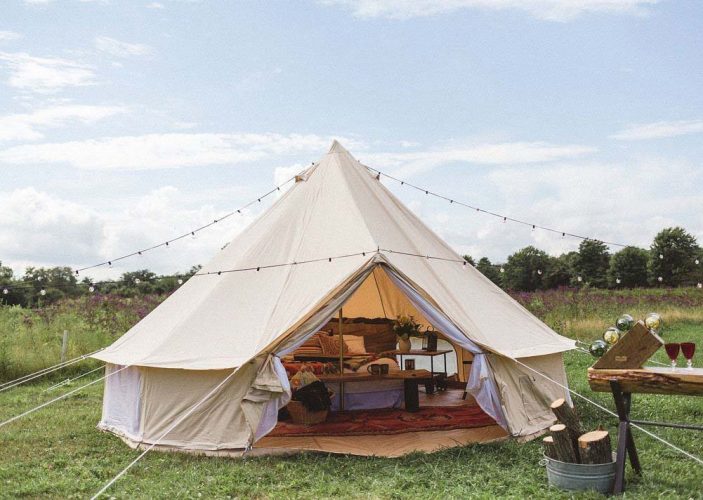
For those that are looking for lots of room a cotton bell tent could be the answer. These are perfect for large groups or for offering luxury accommodation. Perhaps if you’re operating a glamping type business. You can furnish with string lighting as well as a wood burner to create a special, premium space.
Wall tents
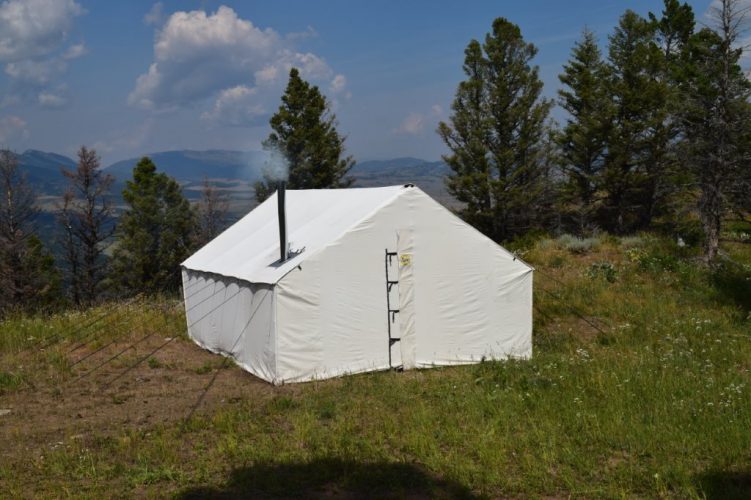
If you’ve ever served in the armed forces you won’t be a stranger to a wall tent. Tall straight sides with a pitched roof and space to store lots of gear. These make great tents for hunters and prospectors that might be camping for weeks at a time.
Truck Bed Tents
Canvas isn’t constrained to traditional-style tents. It’s also been adopted for use with truck bed tents by manufacturers such as Kodiak. Take a premium option tent material to four wheels.
What types of canvas material is available?
Most of the canvas tents we review are made from 100% cotton but a few a made from poly-canvas. This is a mix of polyester and cotton.
Cotton canvas or cotton duck canvas
The tent material for purists. 100% cotton-made, cotton duck canvas is tightly woven yet a breathable tent fabric that will last decades if you look after it.
The only downsides are the relative expense, the weight, and the fact that it can take a while to dry out. This drying out period is essential to preserve the longevity of the tent and avoid mold growth or mildew, which can damage the fibers.
Poly-cotton
The alternative to canvas is poly-cotton/poly-canvas or polyester canvas. This is a lighter hybrid mix of cotton and polyester. It has all the benefits of cotton but is also less prone to rips and the polyester aspect means it’s more resistant to mildew.
What’s the setup time compared to standard tents?
A canvas tent isn’t going to go up as quickly as that pop-up tent you’ve used for overnight camps. But given the weight of most canvas designs, the setup is relatively painless. Those from the market-leading brands like Springbar, Teton, or Kodiak can even be set up by 1 person in around 10 to 15mins. See the video from Springbar below which demonstrates the process.
Who are canvas tents for?
Canvas tents are a heavier option than the majority of polyester or nylon tents on the market. This means they’re not going to be suitable for backpackers or anyone that’s going to venture too far from their car or truck.
Canvas tents aren’t for those in a rush. If you appreciate sitting back and watching the world go by, enjoying the scenery, and just taking stock then camping under canvas could be for you. You’ll also need patience and be meticulous to observe drying our periods.
If you enjoy a long camp out in the wild, perhaps you’re a hunter or prospector then a canvas tent is definitely for you. Likewise, those who enjoy luxury camping will appreciate the benefits of a canvas tent.
Purchasing a tent could also be out of necessity, as a place to live rather than for leisure time. In which case, canvas-made tents are a great option if you can afford them.
Importance of dry storage
It’s vital with the canvas that it’s fully dried out before you put it into storage. On occasion, after a wet night, this might mean hanging around camp before taking your tent down. If you’re on a campground with a 10 am turnaround it might not be ideal. Integrating a stove and stove hole and pipe could help you dry the tent from the inside out.
One trick when storing your tent is to store it with a battery-operated dehumidifier. You can get these for $10-20 and they’ll help prevent mold growth. If you’re thrifty a homemade version is to fill a sock with talc and put this in storage with the tent. Not only will your tent smell nice but it will be completely dry and mold-free.
Options
One of the main additions owners of canvas tents want to add is a stove. While conversion kits are available we would advise you to choose a canvas tent that has already been manufactured with the stovepipe jacket in place. If it’s only heating you’re looking for then you could consider a propane-powered tent heater.
The best canvas tents
Now you’re armed with all the info you need to make an informed choice about the type of canvas tent you should purchase read about some of the best available that we’ve already reviewed below.
Springbar Highline 6 Person Canvas Tent Review
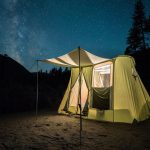 The classic Springbar design of the ’60s was a game-changer. It was water repellent, lighter than the alternatives around, and roomy. It’s been copied by many and some argue that it’s been bettered by cheaper non-US manufactured brands.
The classic Springbar design of the ’60s was a game-changer. It was water repellent, lighter than the alternatives around, and roomy. It’s been copied by many and some argue that it’s been bettered by cheaper non-US manufactured brands.
Let us see if the Highline version of this heavy-duty camping tent still has everything that made the original so good.
Kodiak Flex Bow 6 Person Canvas Tent Review
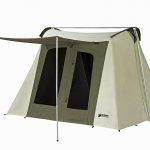 The Flex-Bow range has become synonymous with canvas tents. They’re known to have relatively quick setup times, good build quality, and decent after-sales support. However, supporters of the homegrown Springbar brand say they lack attention to detail and cut corners to get the price down.
The Flex-Bow range has become synonymous with canvas tents. They’re known to have relatively quick setup times, good build quality, and decent after-sales support. However, supporters of the homegrown Springbar brand say they lack attention to detail and cut corners to get the price down.
So will the 6 person model live up to the hype and prove the naysayers wrong?
White Duck Outdoors 4 Season 6-8 Person Canvas Camping Tent Review
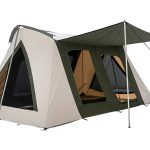 The lesser-known White Duck brand has been quietly going about its business making great tents for families, hunters, and prospectors that are perfect for camping any time of the year. This 6-8 person canvas cabin tent model is spacious and airy with lots of windows but how does it compare to the more well-known brands available?
The lesser-known White Duck brand has been quietly going about its business making great tents for families, hunters, and prospectors that are perfect for camping any time of the year. This 6-8 person canvas cabin tent model is spacious and airy with lots of windows but how does it compare to the more well-known brands available?
Teton Sports Mesa 14 Canvas Tent Review
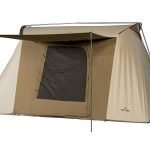
The Teton has all the usual benefits of canvas tents but buyers will also love the handy internal storage solutions plus the enormous D Type doors front and back.
But does the Teton have issues with its seams?
Frequently Asked Questions
Are canvas tents better?
Canvas tents undoubtedly offer better insulation over synthetic-based tent materials. Their breathable nature allows the humidity levels outside to balance inside the tent. When it’s cold outside a canvas tent can hold warmth and when it’s hot outside a canvas tent will be cooler than a synthetic alternative.
Canvas or polycotton is also a much more durable material than nylon or polyester and won’t easily tear.
Are canvas tents waterproof?
Once seasoned canvas tents are extremely waterproof. Before your first trip, you should lightly hose your canvas tent down with water. The cotton fibers will swell and expand then shrink and seal forming a waterproof surface. You can enhance the waterproofing, especially on seams, with products like Nikwax. Just bear in mind that adding too much can affect the breathability of the tent.
How much does a canvas tent weigh?
Canvas tents are significantly heavier than synthetic alternatives and the package will also be bulkier. 6-8 person tents from the likes of Kodiak, Springbar, Teton, and White Duck weigh in the region of 60-80lbs.

Eight years ago, I took a risk and left a miserable office job to follow a lifestyle career that involved my love for the great outdoors. I’ve taken my love for camping, hiking and travel to the next level by running my small campground with a friend near Portland, Oregon. It’s for way less money but this has truly been a dream come true and the running involves lots of family and friends.
The next evolution of that was to get online and start allcampingstuff.com. At our campground, I spend a lot of time setting up camping equipment for customers and disposing of the garbage products they leave behind. If I can help just a few people with advice on good camping gear, then this website venture will be worth it.
So, if you want to avoid the duds and spend your money wisely you’ve hopefully come to the right place.

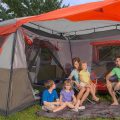
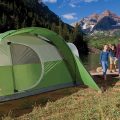
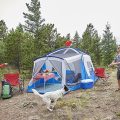





Thank you for the advise
I really appreciated your article as I navigate the new world of canvas tents. Thank you very much!
I’m looking at getting a Kodiak Flex Bow 10×10 or a Teton Sports Mesa 10×10 or 10×14. Which one do you recommend getting? I’m in Alaska with heavy rain so was leaning towards the Kodiak